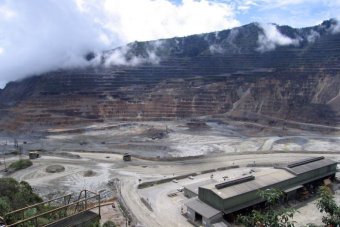PNG government takes control of Ok Tedi mine, repeals laws protecting BHP from legal action over pollution
Updated
Papua New Guinea's government has rammed legislation through parliament giving it complete ownership of the controversial Ok Tedi mine.
Standing orders in parliament were suspended late yesterday so prime minister Peter O'Neill could pass a bill for the state to take complete ownership of the Ok Tedi copper and gold mine on the Fly River in Western Province.
Tailings from the BHP mine caused widespread damage to the Fly River in the 1980s and 90s.
In a deal with the then government in 2001, BHP divested its majority share of the mine to a charitable trust called the PNG Sustainable Development Program, and in return was granted legal immunity.
The mine has continued to operate with the profits being used to promote development in communities affected by the pollution.
Mr O'Neill says the decision to grant immunity to BHP was a bad one and must be corrected.
He has told parliament the deal is unfair and BHP Billiton must own up to its responsibilities resulting from the mine tailings washing down the river.
"This parliament has done gross injustice to our people, denying their right to have access to have their say and have their claims against the damage that was done to the environment and themselves," he said.
"This proposed bill now removes that waiver for BHP Billiton, meaning that the land owners or any other affected party are free to bring any action or enforce any right."
The PNG Sustainable Development Fund had owned 63 per cent of the mine, with the state owning the rest.
The bill cancels PNGSDP's shares and issues new shares to the state, giving it complete ownership.
Mr O'Neill says the government is not taking the shares and PNGSDP will be provided "some" compensation.
In a separate bill, parliament passed legislation making the BHP Billiton now liable for environmental damage caused by the Ok Tedi mine.
Mr O'Neill says corporate entities must own up to their responsibilities and pay compensation.
Mr O'Neill has run a long campaign against BHP and the PNG Sustainable Development Program or PNGSDP as its known.
He believes PNGSDP has failed to live up to its development mandate and is still operating under the influence of BHP.
Former prime minister Sir Michael Somare was the only MP in the house to urge caution.
Interpretation of the outside world will say this is the country that is moving towards nationalisation of major companies in the country. Let us not give that impression please!
Sir Michael Somare
"Interpretation of the outside world will say this is the country that is moving towards nationalisation of major companies in the country. Let us not give that impression please," he said.
The current chairman of the PNGSDP is another former prime minister, Sir Mekere Marauta.
He says the government's move to forcibly take ownership of the mine amounts to theft.
"This is very important legislation. For the first time expropriating assets without payment from the people of Papua New Guinea, not from foreigners," he said.
It is likely the battle for Ok Tedi will go to court, meaning it will probably be some time before the government takes ownership of the mine, if it ever does.
Response from landowners
Parliament's move to repeal BHP's legal immunity from prosecution has received a mixed response.
At large, landownders in the affected area still remain unhappy about what's happened.
Richard Zumoi, spokesman for the Ok Tedi affected landowners told Pacific beat the legislation was like a slap in the face.
"It's just like stealing from the people of Western Province." Mr Zumoi said.
"They just took our rights away."
Martyn Namorong, PNG Political commentator and former research worker for Ok Tedi, told Pacific beat he believed the government was leaving itself open for prosecution by taking ownership and repealing immunity.
"There is the concern that money which has been kept in the long term fund for the benefit of the future generation of Western Province, will now be exposed to political manipulation," Mr Namorong said.
There is every sign the fight between the PNGSDP, and the government will end up in court.
But BHP Billiton says it is confident it can not be sued by Papua New Guinea for environmental damage caused by a mine it used to own.
The big miner says the PNG Government's decision to remove BHP Billiton's legal immunity shows a lack of good faith and makes the country a more risky place to invest.
Topics: world-politics, mining-industry, mining-environmental-issues, business-economics-and-finance, water-pollution, papua-new-guinea, pacific
First posted










